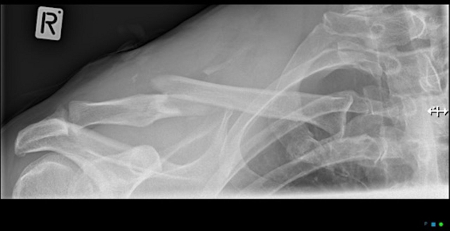Summary
Definition
History and exam
Key diagnostic factors
- pain over clavicle
- guarding
- point tenderness over site of fracture
- soft tissue swelling at site of fracture
- deformity or step-off at site of fracture
- crepitus
Other diagnostic factors
- ecchymosis at site of fracture
- wound overlying site of fracture
- skin tenting
Risk factors
- acute trauma to the clavicle
- male sex
- age <30 years
- age ≥65 years in females
- osteoporosis (pathologic fractures)
- bone tumor (pathologic fractures)
- low BMI (insufficiency fractures)
- prior fracture (insufficiency fractures)
- prolonged corticosteroid use (insufficiency fractures)
Diagnostic tests
1st tests to order
- clavicle x-ray series
- CT chest, abdomen, pelvis
Tests to consider
- chest x-ray
- scapula x-ray series
- shoulder x-ray series
- CT clavicle
- ultrasound of clavicle
- MRI of acromioclavicular or sternoclavicular joint
Treatment algorithm
involved in high-energy trauma
nonstress fractures
stress fractures
Contributors
Authors
Philip H Cohen, MD
Clinical Professor of Medicine
UCLA David Geffen School of Medicine
Los Angeles
CA
Disclosures
PHC has given lectures for MCE Conferences and received a stipend and travel expenses.
Thomas J Kremen, MD
Assistant Professor in Residence
Department of Orthopaedic Surgery
UCLA David Geffen School of Medicine
Los Angeles
CA
Disclosures
TJK is on the editorial board member for American Journal of Sports Medicine.
Fletcher R Preuss, MD
Resident Physician
Department of Orthopaedic Surgery
UCLA David Geffen School of Medicine
Los Angeles
CA
Disclosures
FRP declares that he has no competing interests.
Peer reviewers
James F. Mooney III, MD
Professor
Department of Orthopedic Surgery
Atrium Health Wake Forest Baptist
Winston-Salem
NC
Disclosures
JFM declares that he has no competing interests.
Niel Kang, MBBS, MA (Cantab), FRCS (Tr & Orth)
Consultant Trauma and Orthopaedic Surgeon
Cambridge University Hospitals NHS Trust
Cambridge
UK
Disclosures
NK declares that he has no competing interests.
Peer reviewer acknowledgements
BMJ Best Practice topics are updated on a rolling basis in line with developments in evidence and guidance. The peer reviewers listed here have reviewed the content at least once during the history of the topic.
Disclosures
Peer reviewer affiliations and disclosures pertain to the time of the review.
References
Key articles
Song HS, Kim H. Current concepts in the treatment of midshaft clavicle fractures in adults. Clin Shoulder Elb. 2021 Sep;24(3):189-98.Full text Abstract
Vannabouathong C, Chiu J, Patel R, et al. An evaluation of treatment options for medial, midshaft, and distal clavicle fractures: a systematic review and meta-analysis. JSES Int. 2020 Jun;4(2):256-71.Full text Abstract
Monica J, Vredenburgh Z, Korsh J, et al. Acute shoulder injuries in adults. Am Fam Physician. 2016 Jul 15;94(2):119-27. Abstract
American College of Radiology. ACR appropriateness criteria: acute shoulder pain. 2024 [internet publication].Full text
American Academy of Orthopaedic Surgeons. Treatment of clavicle fractures. Evidence-based clinical practice guideline. Dec 2022 [internet publication].Full text
Reference articles
A full list of sources referenced in this topic is available to users with access to all of BMJ Best Practice.

Differentials
- Clavicle contusion
- Hematoma
- Sprain of acromioclavicular joint
More DifferentialsGuidelines
- ACR appropriateness criteria: shoulder pain-traumatic
- Clinical practice guideline for the treatment of clavicle fractures
More GuidelinesLog in or subscribe to access all of BMJ Best Practice
Use of this content is subject to our disclaimer